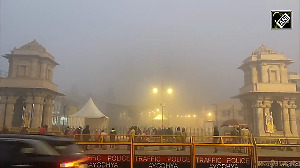 American business leaders are hopeful that the anti-corruption protest in India led by activist Anna Hazare would not sidetrack burgeoning economic ties between the two countries, but would, in the long term create a better climate for American investment.
American business leaders are hopeful that the anti-corruption protest in India led by activist Anna Hazare would not sidetrack burgeoning economic ties between the two countries, but would, in the long term create a better climate for American investment.The Hazare-led campaign has got wide publicity in the US media.
With the US dealing with the recent downgrade of its government's credit rating by Standard & Poor's, steep sell-offs in the stock market and the possibility of double-dip recession (as cautioned by investment bank Morgan Stanley in its latest report), and turmoil in the euro zone, trade with India is seen as one of the bright spots.
Bilateral trade was $25 billion five years earlier and has since doubled.
The Washington DC-based US-India Business Council, or USIBC, expects the figure to touch a new high this year, helped by India's $4-billion order for Boeing's C-17 military cargo aircraft.
The USIBC is keen to reassure American businesses that India remains a desirable destination and source for investment in the midst of nationwide anti-corruption protests and the series of corruption scandals over the past several months.
USIBC president Ron Somers said: "What we don't want to do is tarbrush India in a larger South Asian context and discourage investment the last thing we want is any hesitation among Indian and US businessmen."
Brighter side
More so, says Somers, because the developments in India in fact demonstrate that "systems up and down the polity are insisting on better governance", and adds that more transparency and predictability would be good for businesses in both countries.
Raghuram Rajan, a former chief economist at the IMF and currently the Eric J Gleacher Professor of Finance at the University of Chicago, says the protests in India, while these may be disruptive in the short term, would create a better investment climate in the long run.
One, where "good business trumps over crooked business".
He urges attention to both positive and negative aspects, that while major corruption had taken
"People were put behind bars. That's exactly what should happen as a deterrent against corruption," agrees Somers.
He also points out that anti-corruption activism has targeted politicians across party lines, with Karnataka's erstwhile Lokayukta, Santosh Hegde, responsible for ousting the state's BJP chief minister on grounds of corruption.
"Anna Hazare is part of a growing chorus. The trend is positive and is good for business and democracy," says Somers.
While momentum on the political front of the bilateral equation may have slowed a bit this year, due to the US preoccupation with fights on the debt ceiling, deficit and the budget, and Indian parties focusing on state assembly elections, Somers says the lull did not spill over to business.
"There may have been a government to government pause, but business has gone full steam ahead," he said.
Wider view
But corruption in India has made news in the US outside the context of the Hazare-led movement as well.
Business leaders and corporate lawyers have noted increased enforcement by the US of the Foreign Corrupt Practices Act, which has included action against companies bribing officials in India.
Rajan believes India not only needs to act against corrupt officials, but also eliminate opportunities for corruption.
"We need to continue the process of reform and reduce nonsensical rules that allow corruption to flourish," he says, adding that a lot of corruption surrounds land use and acquisition.
Commentators in the US have taken pains to distinguish between the protests in India and other popular movements like the so-called Arab Spring, noting the demonstrations in India were an expression of democracy, not a demand for it.
Rajan says the awareness of corruption and protests against it will be good for India in the long run, but cautions that society must be careful to create a framework that respects the rule of law without room for 'my way or the highway' demands.
"Sometimes, rule of law is a little slower, but in the long run, more effective than public outrage," says Rajan.












 © 2025 Rediff.com -
© 2025 Rediff.com -